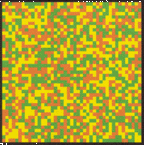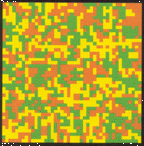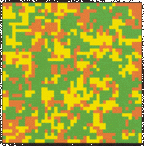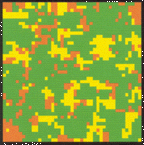Ethics Decision Theory Simulations
by Joseph Schreiner
What is Special About This Web Site?
Plenty of ink, paper, electricity, and circuitry have been devoted to the analysis of the Prisoner's Dilemma. Do I, Joseph Schreiner, have anything new or unique to offer? I believe I do.
1) Almost all scientific research in the area of ethical decision making has been based on the simple 2 by 2 encounter matrix, the traditional Prisoner's Dilemma. Agents have only two choices. I have moved beyond this by systematically analyzing decision matrices where the Agents have 2, 3, or 4 options from which to choose.

2) In the Prisoner's Dilemma, the decision is always between Cooperate or Defect, Trust or Betrayal. The Prisoner's Dilemma has few degrees of freedom. I move beyond this by using payoff matrices based on many more degrees of freedom. My Neutral scenario, statistically, contains the most degrees of freedom, just slightly less than double the number of cells within the encounter matrix. Agents must consider many more factors before making a decision within an encounter.
3) In sophisticated mathematical analyses of the Prisoner's Dilemma, researchers use 4 values, (P)unishment, (R)eward, (S)ucker's Payoff, and (T)emptation, to determine the intensity of the dilemma. I show that these 4 parameters can be collapsed into one, the Payoff Correlation, which can vary anywhere between -1.00 and 1.00. This one parameter determines the intensity of the encounter, and we can study how it affects the decision-making process.

4) I also advance the quantification of ethical outcomes. Commonwealth, the joint gain of the two agents, is the traditional measure of decision efficacy. The collective gain of all Agents is often taken as the sole measure of efficacy. To this, I add another, independent dimension of ethics - Equality. An ethical outcome must take both factors into account. Moreover, as my extreme scenarios indicate, Commonwealth and Equality do not necessarily contribute equally to the final ethical outcome. I demonstrate that as one factor waxes in importance, the other necessarily wanes.
5) And finally, I examine the effects of group membership. Groups are bound together either by a system of mutual support and/or sharing a common, altruistic strategy for in-group members. Individuals make different decisions when they are members of groups, and they have ethical consequences.

These five factors (more than 2 options, many degrees of freedom, an intensity parameter, multiple measures of ethics, and group membership) allow us to make more sophisticated analyses of the decision making process.
I believe that the obsession with Prisoner's Dilemma models, though productive in the past, now hampers future research into ethics. Prisoner's Dilemma models are the easiest to analyze: each encounter has only 4 possible outcomes, each Agent has only two options, and the choice is simply Cooperate vs. Defect. This is a good foundation for the discipline, dealing with the simplest of situations. However, the real world is far more complex, and ethics research needs to accommodate this complexity.

The obsession with the Prisoner's Dilemma is analogous to the quandary of those trying to explain the methods of evolution. A series of choices as stark as Cooperate vs. Defect is similar to trying to explain how humanity might have arisen from the primordial ooze in a single step. The transition from ooze to human being cannot be explained so simply. But a model that recognizes many choices, with many interactions, and many degrees of freedom is better able to describe a path by which purely selfish beings can form highly cooperative, ethical societies. I hope my research is a start in this direction.
To best understand my research, you might first want to acquaint yourself with the terminology I use, and how I quantify ethics. It is better if you then acquaint yourself with the simulations I ran on no-group populations. Once acquainted with individual results, you will better understand how group membership affects the decision process. But if you just want to jump through the pages at your own initiative, do not let my stodgy advice stop you.